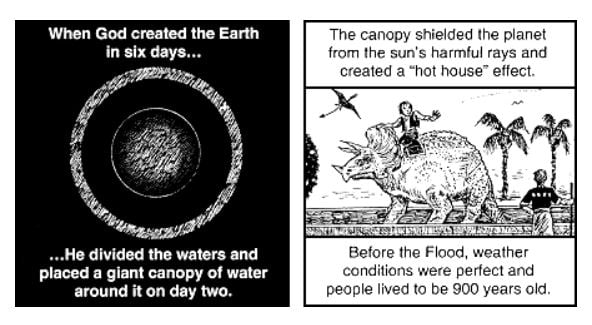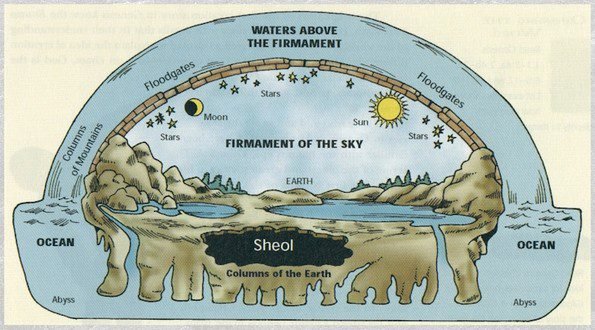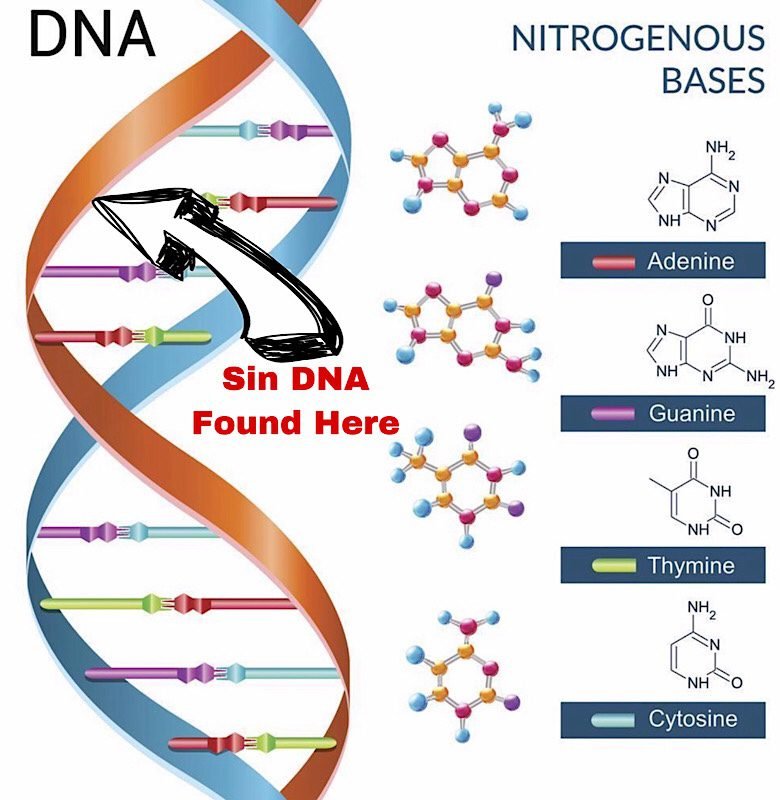
Ken Ham, known as the ayatollah and grand poohbah of Kentucky and a purveyor of Fundamentalist ignorance, frequently writes articles about atheism. Several years ago, Ham asked and then answered the question, Why Do Atheists Care? Here is some of what this noted intellectual genius of young-earth creationism had to say:
Atheists get very passionate when it comes to fighting biblical Christianity. If God doesn’t exist—and life has no ultimate meaning—why do they even care?
Why do atheists get so emotional and aggressive in opposing biblical Christianity? Why does it bother them? Why does it matter at all to them?
When Answers in Genesis announced plans to build the Creation Museum, a local atheist group began attacking the ministry of Answers in Genesis and campaigning against the museum. When the museum was opened, the atheists gathered outside the museum to protest the opening of this facility. But why did they do this?
At the time of this issue’s publication, atheists are aggressively opposing a new project involving the building of a life-size Noah’s Ark, the Ark Encounter. But what is it to atheists if Christians build such a facility to proclaim the Christian message? After all, thousands of secular museums across the USA and other countries around the world are already proclaiming an atheistic evolutionary message to the public. Government schools throughout the world by and large indoctrinate hundreds of millions of the coming generations in naturalism—really atheism.
So why do atheists get so upset with a minority that stands for biblical Christianity?
During my debate with Bill Nye “the Science Guy” on February 4, 2014, Bill was asked where matter came from. In his answer he said it was a great mystery, but he loved the “joy of discovery” as he pursued such questions. In my responses to Bill’s answers, I asked him why the joy of discovery mattered to him. I explained that from Bill’s perspective, life is the result of natural processes and there is no biblical God, so when he dies, he won’t even know he ever existed or knew anything. Then, when others who knew him die, they won’t know they ever knew him, either. Eventually, from his perspective of naturalism, the whole universe will die and no one will ever know they ever existed. So what is the purpose of this “joy of discovery”? Really, the naturalistic view of life is ultimately purposeless and meaningless!
Think about the well-known atheist Richard Dawkins. Why does he spend so much time writing and speaking against Someone (God) he doesn’t believe exists? Why is he so aggressive against biblical Christianity? In an ultimately purposeless and meaningless existence, why does it matter to him if people believe in the God of the Bible and the account of creation as outlined in Genesis? Why bother fighting against such people when, from his perspective, eventually no one will even know they ever existed?
No matter how many times atheists point out to Ham that they don’t live purposeless and meaningless lives, he continues to recite these lies as a six-year-old would when reciting his memory verse in Sunday school. Ham seems to think that if he repeats the same lie over and over, it will magically become true. Later in the same article, Ham continues his lying ways by telling readers that atheists “aren’t fighting for the truth, but suppressing it” — “truth” being Ham’s literalistic interpretation of the Christian Bible. According to Ham:
Really then, when Bill Nye, Richard Dawkins, and others so aggressively oppose biblical Christianity, what they are doing is this. They are covering their ears and closing their eyes and saying, “I refuse to submit to the God who created me. I refuse to acknowledge that God is the creator. I refuse to accept that I’m a sinner in need of salvation. I want to write my own rules! Therefore I must oppose anything that pricks my conscience and aggressively suppress [sic] the truth to justify my rebellion.”
…..
So why do these who so aggressively oppose Christianity care? They care because they are desperately trying to justify their rebellion against the truth. They don’t want to admit that they are sinners in need of salvation and thus need to submit to the God who created them and owns them.
Again, Ham continues to lie, refusing to accept the reasons atheists give for not believing in his peculiar version of God. Our objection to Christianity, its God, and the Bible is not one of deliberate denial of truth. Far from it. Many atheists such as myself spent most of our lives reading and studying the Bible. We know the Bible from cover to cover. It is not that we have some sort of intellectual deficiency or have some secret desire to eat babies or star in porn movies. Our rejection of Christianity is based on our careful examination of its claims. Are the claims Christians make for God, Jesus, and the Bible true? The atheist says no. Rather than accept this, Ham lies and tells his followers that the real reason atheists aren’t Christians is that they suppress the truth and are in rebellion to God.
At one time I was willing to give Ham the benefit of the doubt. I thought, Ham is sincere. He genuinely wants atheists to be saved. I no longer believe this. Since Ham refuses to accurately report the atheistic/agnostic/humanistic/secularist worldview, I can only conclude that he has some sort of ulterior motive that requires him to lie about his adversaries. What could that motive be? you ask. I think Ken Ham needs atheists. He needs an enemy to fight, a war to wage. Ham believes that True Christians® are called on to wage war against Satan and his earthly emissaries. Atheists are an easy target because most Evangelicals equate atheism with Satanism (and Ham does nothing to dispel this notion). Ham knows that Evangelicals — his primary target audience — live lives that are indistinguishable from those of non-Christians. In order to stir up the passions of these passive Christians, Ham uses hyperbolic language when speaking of his three great enemies: secularism, atheism, and liberalism. Ham knows that stirred passions mean more donations, so this is THE reason Ham continues to misrepresent what atheists and secularists really believe. Ham lies because lying is good for business. Evangelicals, thanks to rapturist eschatology, are conditioned to believe the “world” is an awful place and should be avoided at all costs. And what better way to avoid the world than to visit Ham’s monuments to ignorance — the Creation Museum and the Ark Encounter.
Ham knows that his Museum and Ark theme park won’t bring people to a saving knowledge of Jesus Christ. I don’t know of one atheist who has become a Christian as a result of visiting Ham’s entertainment facilities. Ham’s goal has never been to save souls. The Creation Museum and the Ark Encounter are meant to reinforce Evangelical young-earth creationist beliefs. Why does Ham encourage Christian parents to bring their children to the Museum and Ark Encounter (by giving children free admission)? Why are most of the things in these facilities geared towards teenagers and young children (i.e., zip line, petting zoo)? Ham’s objective is to indoctrinate another generation in the creationist way of thinking. By focusing on children, Ham ensures that when these children grow up and marry that they too will bring their children for a visit, thus providing continued income for his empire.
As with much that goes on in the name of the Christian God, it is all about money. Ham knows that the key to his future prosperity rests on his ability to generate income. That was the real reason for building the Ark Encounter. Creation Museum visit numbers and income were in decline, and Ham needed something that would stir the passions of his fellow Evangelicals, resulting in them paying his ministries a visit. By building a wood replica of a fictional boat and throwing in a few amenities homeschoolers and children will be sure to love, Ham ensured that the next few years will have increased revenues. Knowing that revenues will later decline, Ham is already planning to build a new attraction, a monument to speaking in tongues, the Tower of Babel. What’s next? A water park where children can watch God drowning men, women, children, and unborn children while Noah and his clan float by in a wood boat?
Ham knows that fighting the atheist horde increases the bottom line, and it is for this reason he really doesn’t want to see any of us saved. If all the secularists and atheists got saved, Ham wouldn’t have anyone to rail against. And with no enemy, revenues would decline and Ham’s monuments to ignorance would fall into disrepair. Ham will continue to lie about atheism because, in his mind, the end justifies the means. He cares more about money than he does honesty. For those creationists who object to my portrayal of Ham as a money-grubbing liar, the easy way to repudiate my claims is for Ken Ham and his ministries to publicly release their financial reports. Of course, it will be a cold day in Kentucky before Ham ever releases his financials.
Twenty years from now, Ham’s ministries will be in decline, facing increasing financial pressures. Ham surely knows that Evangelicals won’t treat the Creationist Museum and the Ark Encounter as they do nearby King’s Island. Once Evangelicals have visited the Museum and Ark Encounter, they are unlikely to return. Been there, done that, Evangelicals say to themselves. Imagine children being forced to repeatedly visit a museum. Doing so is not their idea of summer fun. When asked what they would rather do: visit Bro Ham’s ministry or go to King’s Island/Cedar Point, I suspect most children will quickly opt to ride roller coasters. And since the Museum/Ark Encounter combo ticket is more expensive than that of the amusement parks, many Evangelical parents will decide to take their families to one of the theme parks instead. Facing financial decline, Ham will be forced to scale back his empire. As science continues to draw future creationists away from his pernicious teachings, Ham will be forced to rely on fund-raising appeals or large estate donations from dead supporters. These too will dry up as older supporters die off. By then Ham will likely be dead, leaving others with the responsibility to manage the Creationist Titanic. Eventually, Ham’s monuments to ignorance will close their doors and become decaying testimonies to the dying breaths of a thoroughly discredited system of belief. I will likely be dead when this happens, so I will leave it to my grandchildren to say good riddance.
Bruce Gerencser, 68, lives in rural Northwest Ohio with his wife of 47 years. He and his wife have six grown children and sixteen grandchildren. Bruce pastored Evangelical churches for twenty-five years in Ohio, Texas, and Michigan. Bruce left the ministry in 2005, and in 2008 he left Christianity. Bruce is now a humanist and an atheist.
Your comments are welcome and appreciated. All first-time comments are moderated. Please read the commenting rules before commenting.
You can email Bruce via the Contact Form.








